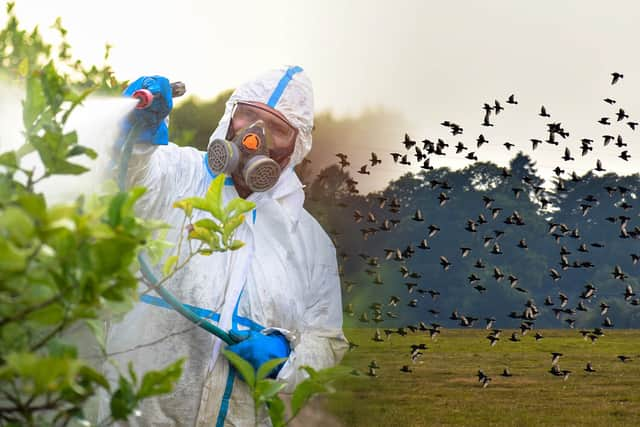Warning over pesticides and fertilisers use as bird species declines by 25% across UK and Europe
and live on Freeview channel 276
The use of pesticides and fertilisers on farmland have been found to be the major cause of the population of common bird species declining by 25% across the UK and Europe.
A new study has found that the intensification of modern farming practices, using pesticides and fertilisers, has led to the decline of many populations.
Advertisement
Hide AdAdvertisement
Hide AdThe study used data from 28 countries across a 37-year period from 1980 to 2016 and researchers learnt that farmland species have more than halved over the period with woodland birds declining by 18%, urban dwellers by 28%, northern, cold-preferring birds by 40% and southern, warm-preferring birds by 17%.
Birds that rely on insects for food, such as the swift, yellow wagtail and spotted flycatcher, have been worse off.
Data from the UK came from the BTO/JNCC/RSPB Breeding Bird Survey and its predecessor the Common Birds Census, which 8,500 volunteers contributed to over nearly 30 years.


The collaborative study, published in the journal PNAS, also found direct relationships between declines in bird populations and other environmental issues, such as reduced forest cover, urbanisation and higher temperatures because of climate change.
Advertisement
Hide AdAdvertisement
Hide AdRichard Gregory, lead author for the RSPB, said this study “is the first to look at the major man-made drivers” that is causing bird declines in the UK and Europe.
He added that the results are “compelling” and show “what must be done to turn things around.”
James Heywood, national organiser for the Breeding Bird Survey, said: “The decline of farmland birds across Europe is one of the stand-out observations from this study, in particular just how widespread they are.
“What is also highlighted is just how little woodland the UK holds compared to our neighbours on the continent.”
Advertisement
Hide AdAdvertisement
Hide AdHe added: “That said, the study makes clear that a simple increase in forest cover can mask other changes, particularly in the quality and nature of forests; the planting of managed forests won’t produce the same benefits for birds as old-growth forests or ancient woodlands, for example. This is very much a problem that we are facing within the UK.”
The RSPB said the wildlife on Hope Farm, Cambridgeshire, which it has run since 2000 with nature-friendly practices, has made a strong recovery with a 177% increase in the number of farmland bird territories and butterfly numbers up by 398%.
Alice Groom, RSPB’s head of sustainable land use policy England, said that the increase of “our reliance on pesticides and fertiliser” has come “at a huge cost to our wildlife and the health of the environment.”
She added: “Without farmers we haven’t a hope of tackling the nature and climate emergency, but they need the right policies and support in place if they are to produce healthy food while helping to reverse wildlife declines and restore the environment.”
The RSPB said the study shows the need for nature-friendly farming to become the norm and for the UK government to support farmers in making the switch.
Comment Guidelines
National World encourages reader discussion on our stories. User feedback, insights and back-and-forth exchanges add a rich layer of context to reporting. Please review our Community Guidelines before commenting.
